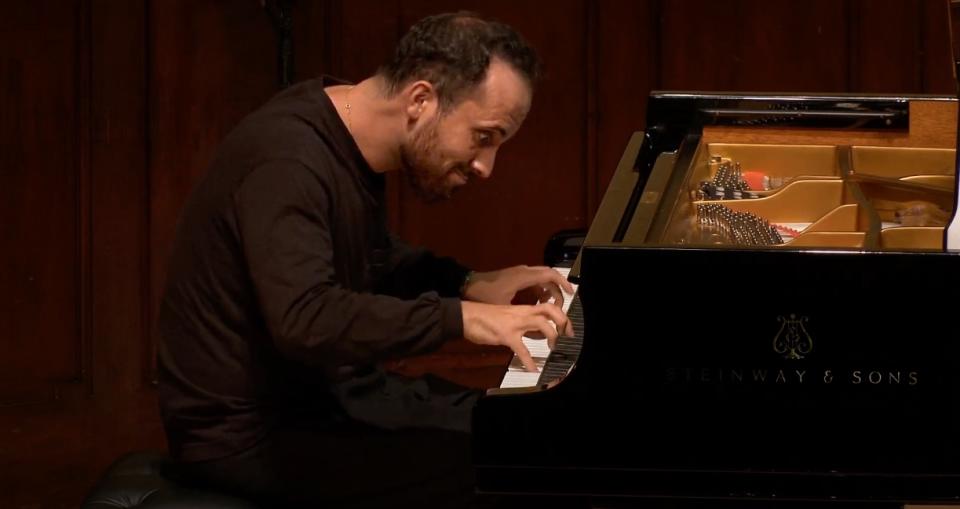How live recitals are still an unalloyed pleasure despite COVID restrictions

Fidelio, Garsington Opera
★★★★
Igor Levit, Wigmore Hall, London
★★★★★
Live music may be under existential threat, but only its boldest companies are confronting that head-on: a big hand for the Wigmore Hall and Garsington Opera. After sampling both – a live recital at the Wigmore and a complete opera at Garsington, both played to live audiences – it’s nice to be able to report that these performances tricked out with the full panoply of COVID precautions can still be an unalloyed pleasure.
Garsington chose to mark their return with Peter Mumford’s concert production of Fidelio under Douglas Boyd’s baton, but this required some clever digital splicing. The celebrated Prisoners’ Chorus was delivered by 15 members of Garsington’s Digital Young Artists Programme. Each recorded their individual performance at home with the aid of a rehearsal video plus a piano accompaniment track, all of which was conducted rather than set to a metronome click track. The recordings were then combined on stage with the Philharmonia Orchestra’s live performance. The other choral sections were sung by five members of this year’s Garsington Young Artists programme.
Garsington’s normally capacious dining marquees have shrivelled this year to accommodate just twos and fours – no mingling allowed – and there are many anti-COVID obstacles to pass before we reach our seats. Once inside the auditorium, however, it all starts to feel familiar, and the overture comes over with appropriate fire and fury, despite the fact that there are only 14 players. And what a pleasure to hear again those live instrumental textures.
In order to keep the show manageably short – there being no interval, to obviate the need for toilet queues – the spoken dialogue has been cut entirely, but since that dialogue in the first act is way too garrulous, it’s a mixed blessing at the best of times. Instead, we get surtitles (not always easy to read). But since Beethoven’s drama is all in the music, we know perfectly well what’s going on, even in the quartet where all four singers are at cross-purposes.
And it’s no impediment that each singer performs in their own personal pool of light: I can think of kosher opera productions with such a device as their stylised calling card, including one at Covent Garden where Tristan and Isolde delivered the climactic duet imprisoned by their respective spotlights on opposite sides of the stage.

In a strong cast, soprano Katherine Broderick’s soaring power as Leonore cuts through everything, while Galina Averina’s exquisitely sung Marzelline makes a lovely foil. Bass Stephen Richardson brings unusual warmth to the part of gaoler Rocco, while Toby Spence’s incarnation of his prisoner Florestan becomes the portrait of a soul in torment. The message of the piece – a paean to democracy – comes over with its essential timelessness, here allowing images of Belarus to form in the mind.
Meanwhile, our approach to the Wigmore is even more cautiously controlled, with ushers insisting that we keep our masks on even during the performance, and with Igor Levit not taking his off until he’s on the piano stool. The programme consists of four Beethoven sonatas, and since this German-Russian pianist is one of the greatest exponents of this music in the world, we’re guaranteed a feast. He doesn’t disappoint: the first movement of Sonata No 1 emerges with combative brilliance, followed by a slow movement of expansive tenderness; the funeral march sonata has massive resonance, and the “easy” little G major sonata is not overblown; the Waldstein, which Levit famously regards as the great turning-point in pianistic history, opens with gathering thunder and rises to dazzling virtuosity, even if with speed occasionally threatens to trump articulation. His technique seems effortless, his command of colour is absolute, and in the Adagio he finds visionary poetry.
The applause at the end is so noisy and ecstatic that it completes one’s impression that this was a perfectly normal concert. After telling us how thrilled he is to be performing here once more, Levit then plays the UK premiere of a short piece entitled Trees by the American jazz pianist Fred Hersch. Suffused with an oblique and tentative charm, it gracefully rounds off this stunning performance by a master at the height of his powers.
But Levit is also a man with a message. On the day after lockdown began in Germany, he started to stream what he called “house concerts” on-demand from his flat in Berlin, and over the course of the next few weeks he acquired 100,000 followers on Twitter. His grand finale, after 51 such concerts, was a variegated performance of Satie’s Vexations in its 20-hour entirety – the same short piece repeated 840 times – which he dedicated to raising awareness of the plight of freelance artists everywhere.
This extraordinary project has induced him to think anew about concerts in general, and about the now-unthinkable economics which used to underpin them. The command structure of agents and managers, and the hierarchies of “great” music, were now completely beside the point. “Audiences have become an essential part of the story,” he told The Times last week. “To hell with corona, if only this [streaming in response to listeners’ requests] will remain when things get back to normal, I would be beyond happy.” A radical and thought-provoking idea, which may well be a pointer to the future.
Read more
Classical reviews: Beethoven and Mahler
Olivia Colman to feature on a classical music album alongside Michael Morpurgo

 Yahoo News
Yahoo News 